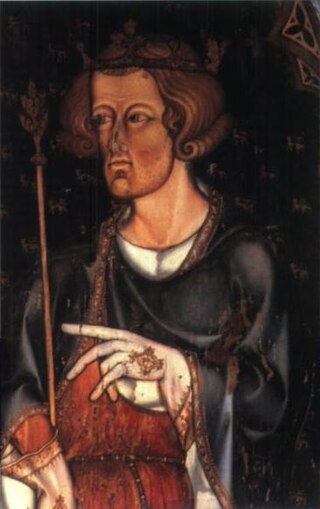Habeas corpus is a recourse in law by which a report can be made to a court in the events of unlawful detention or imprisonment, requesting that the court order the person's custodian to bring the prisoner to court, to determine whether their detention is lawful.

Magna Carta Libertatum, commonly called Magna Carta or sometimes Magna Charta, is a royal charter of rights agreed to by King John of England at Runnymede, near Windsor, on 15 June 1215. First drafted by the Archbishop of Canterbury, Cardinal Stephen Langton, to make peace between the unpopular king and a group of rebel barons, it promised the protection of church rights, protection for the barons from illegal imprisonment, access to swift and impartial justice, and limitations on feudal payments to the Crown, to be implemented through a council of 25 barons. Neither side stood by their commitments, and the charter was annulled by Pope Innocent III, leading to the First Barons' War.

The Bill of Rights 1689 is an Act of the Parliament of England that set out certain basic civil rights and clarified who would be next to inherit the Crown. It remains a crucial statute in English constitutional law.
Due process of law is application by the state of all legal rules and principles pertaining to a case so all legal rights that are owed to a person are respected. Due process balances the power of law of the land and protects the individual person from it. When a government harms a person without following the exact course of the law, this constitutes a due process violation, which offends the rule of law.

The Petition of Right, passed on 7 June 1628, is an English constitutional document setting out specific individual protections against the state, reportedly of equal value to Magna Carta and the Bill of Rights 1689. It was part of a wider conflict between Parliament and the Stuart monarchy that led to the 1639 to 1653 Wars of the Three Kingdoms, ultimately resolved in the 1688-89 Glorious Revolution.

The Parliament of England was the legislature of the Kingdom of England from the 13th century until 1707 when it was replaced by the Parliament of Great Britain. Parliament evolved from the great council of bishops and peers that advised the English monarch. Great councils were first called Parliaments during the reign of Henry III. By this time, the king required Parliament's consent to levy taxation.

The Statutes of Mortmain were two enactments, in 1279 and 1290, passed in the reign of Edward I of England, aimed at preserving the kingdom's revenues by preventing land from passing into the possession of the Church. Possession of property by a corporation such as the Church was known as mortmain, literally "dead hand". In medieval England, feudal estates generated taxes for the King, principally on the grant or inheritance of the estate. If an estate became owned by a religious corporation which could never die, could never attain majority, and could never be attainted for treason, these taxes never became payable. It was akin to the estates being owned by the dead, hence the term.

The United Nations General Assembly Resolution 2758 was passed in response to the United Nations General Assembly Resolution 1668 that required any change in China's representation in the UN be determined by a two-thirds vote referring to Article 18 of the UN Charter. The resolution, passed on 25 October 1971, recognized the People's Republic of China as "the only legitimate representative of China to the United Nations" and removed "the representatives of Chiang Kai-shek" from the United Nations.

The First Barons' War (1215–1217) was a civil war in the Kingdom of England in which a group of rebellious major landowners led by Robert Fitzwalter waged war against King John of England. The conflict resulted from King John's disastrous wars against King Philip II of France, which led to the collapse of the Angevin Empire, and John's subsequent refusal to accept and abide by Magna Carta, which John had sealed on 15 June 1215.

John de Braose, known as Tadody to the Welsh, was the Lord of Bramber and Gower.

Human rights in the United Kingdom concern the fundamental rights in law of every person in the United Kingdom. An integral part of the UK constitution, human rights derive from common law, from statutes such as Magna Carta, the Bill of Rights 1689 and the Human Rights Act 1998, from membership of the Council of Europe, and from international law.

Quia Emptores is a statute passed by the Parliament of England in 1290 during the reign of Edward I that prevented tenants from alienating their lands to others by subinfeudation, instead requiring all tenants who wished to alienate their land to do so by substitution. The statute, along with its companion statute Quo Warranto also passed in 1290, was intended to remedy land ownership disputes and consequent financial difficulties that had resulted from the decline of the traditional feudal system in England during the High Middle Ages. The name Quia Emptores derives from the first two words of the statute in its original mediaeval Latin, which can be translated as "because the buyers". Its long title is A Statute of our Lord The King, concerning the Selling and Buying of Land. It is also cited as the Statute of Westminster III, one of many English and British statutes with that title.

The Golden Bull of 1222 was a golden bull, or edict, issued by Andrew II of Hungary. King Andrew II was forced by his nobles to accept the Golden Bull (Aranybulla), which was one of the first examples of constitutional limits being placed on the powers of a European monarch. The Golden Bull was issued at the year 1222 diet of Fehérvár. The law established the rights of the Hungarian nobility, including the right to disobey the King when he acted contrary to law. The nobles and the church were freed from all taxes and could not be forced to go to war outside of Hungary and were not obligated to finance it. This was also a historically important document because it set down the principles of equality for all of the nation's nobility. Seven copies of the edict were created, one for each of the following institutions: to the Pope, to the Knights Templar, to the Knights Hospitaller, to the Hungarian king itself, to the chapters of Esztergom and Kalocsa and to the palatine.
In political philosophy, the right of revolution is the right or duty of a people to "alter or abolish" a government that acts against their common interests or threatens the safety of the people without justifiable cause. Stated throughout history in one form or another, the belief in this right has been used to justify various revolutions, including the American Revolution, French Revolution, the Russian Revolution, and the Iranian Revolution.

The Charter of the Forest of 1217 is a charter that re-established for free men rights of access to the royal forest that had been eroded by King William the Conqueror and his heirs. Many of its provisions were in force for centuries afterwards. It was originally sealed in England by the young King Henry III, acting under the regency of William Marshal, 1st Earl of Pembroke.

A bill of rights, sometimes called a declaration of rights or a charter of rights, is a list of the most important rights to the citizens of a country. The purpose is to protect those rights against infringement from public officials and private citizens.

Robert de Gresle (1174–1230) was a Lord of the manor of Manchester, the first of his family to take up residence in Manchester. Initially the Gresle family, were absentee landlords, living elsewhere, with Stewards to represent them locally.

Parliament in the Making was a programme of events organised by the Parliament of the United Kingdom to commemorate a series of anniversaries in 2015 including:

The strawman theory is a pseudolegal conspiracy theory originating in the redemption/A4V movement and prevalent in antigovernment and tax protester movements such as sovereign citizens and freemen on the land. The theory holds that an individual has two personas, one of flesh and blood and the other a separate legal personality and that one's legal responsibilities belong to the strawman rather than the physical individual.














